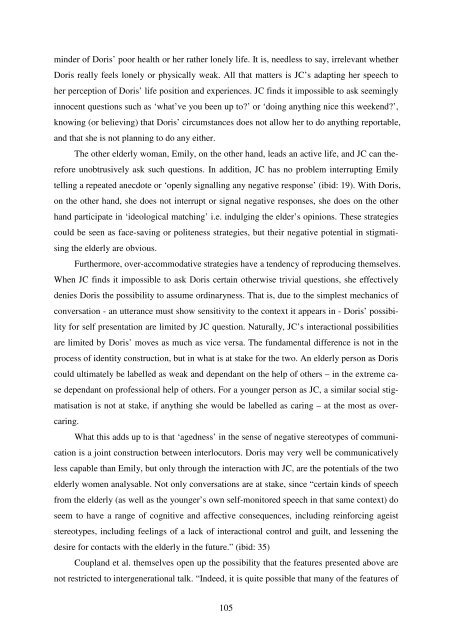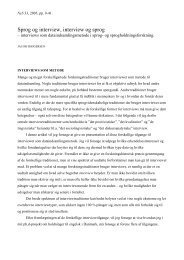Hør dog hvad de siger - Note-to-Self: Trials & Errors
Hør dog hvad de siger - Note-to-Self: Trials & Errors
Hør dog hvad de siger - Note-to-Self: Trials & Errors
You also want an ePaper? Increase the reach of your titles
YUMPU automatically turns print PDFs into web optimized ePapers that Google loves.
min<strong>de</strong>r of Doris’ poor health or her rather lonely life. It is, needless <strong>to</strong> say, irrelevant whether<br />
Doris really feels lonely or physically weak. All that matters is JC’s adapting her speech <strong>to</strong><br />
her perception of Doris’ life position and experiences. JC finds it impossible <strong>to</strong> ask seemingly<br />
innocent questions such as ‘what’ve you been up <strong>to</strong>?’ or ‘doing anything nice this weekend?’,<br />
knowing (or believing) that Doris’ circumstances does not allow her <strong>to</strong> do anything reportable,<br />
and that she is not planning <strong>to</strong> do any either.<br />
The other el<strong>de</strong>rly woman, Emily, on the other hand, leads an active life, and JC can the-<br />
refore unobtrusively ask such questions. In addition, JC has no problem interrupting Emily<br />
telling a repeated anecdote or ‘openly signalling any negative response’ (ibid: 19). With Doris,<br />
on the other hand, she does not interrupt or signal negative responses, she does on the other<br />
hand participate in ‘i<strong>de</strong>ological matching’ i.e. indulging the el<strong>de</strong>r’s opinions. These strategies<br />
could be seen as face-saving or politeness strategies, but their negative potential in stigmati-<br />
sing the el<strong>de</strong>rly are obvious.<br />
Furthermore, over-accommodative strategies have a ten<strong>de</strong>ncy of reproducing themselves.<br />
When JC finds it impossible <strong>to</strong> ask Doris certain otherwise trivial questions, she effectively<br />
<strong>de</strong>nies Doris the possibility <strong>to</strong> assume ordinaryness. That is, due <strong>to</strong> the simplest mechanics of<br />
conversation - an utterance must show sensitivity <strong>to</strong> the context it appears in - Doris’ possibi-<br />
lity for self presentation are limited by JC question. Naturally, JC’s interactional possibilities<br />
are limited by Doris’ moves as much as vice versa. The fundamental difference is not in the<br />
process of i<strong>de</strong>ntity construction, but in what is at stake for the two. An el<strong>de</strong>rly person as Doris<br />
could ultimately be labelled as weak and <strong>de</strong>pendant on the help of others – in the extreme ca-<br />
se <strong>de</strong>pendant on professional help of others. For a younger person as JC, a similar social stig-<br />
matisation is not at stake, if anything she would be labelled as caring – at the most as over-<br />
caring.<br />
What this adds up <strong>to</strong> is that ‘agedness’ in the sense of negative stereotypes of communi-<br />
cation is a joint construction between interlocu<strong>to</strong>rs. Doris may very well be communicatively<br />
less capable than Emily, but only through the interaction with JC, are the potentials of the two<br />
el<strong>de</strong>rly women analysable. Not only conversations are at stake, since “certain kinds of speech<br />
from the el<strong>de</strong>rly (as well as the younger’s own self-moni<strong>to</strong>red speech in that same context) do<br />
seem <strong>to</strong> have a range of cognitive and affective consequences, including reinforcing ageist<br />
stereotypes, including feelings of a lack of interactional control and guilt, and lessening the<br />
<strong>de</strong>sire for contacts with the el<strong>de</strong>rly in the future.” (ibid: 35)<br />
Coupland et al. themselves open up the possibility that the features presented above are<br />
not restricted <strong>to</strong> intergenerational talk. “In<strong>de</strong>ed, it is quite possible that many of the features of<br />
105



